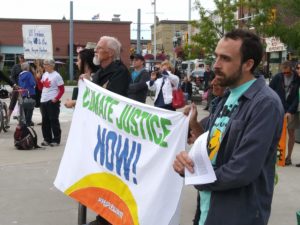Spirited Reflection: Getting past ecological grief

On a cool, windy afternoon in early September, speakers took to the microphone at Waterloo Public Square joining people on seven continents to “Rise for Climate.” When two young adults took their turns, their tears and cracked voices stirred something deep inside all gathered and we uttered words of encouragement and comfort in response. It was a visceral experience of ecological grief – as much for the present as for what’s to come.
“Ecological grief” is shorthand for describing a growing existential phenomenon. Those who live in regions confronted by melting permafrost, chronic drought and recurring hurricanes experience this grief most directly. A former hunter and trapper in Rigolet, Nunatsiavut said: “People are not who they are. They’re not comfortable and can’t do the same things. If something is taken away from you, you don’t have it. If a way of life is taken away because of circumstances you have no control over, you lose control over your life.”i
Ecological grief manifests itself differently among generations. For many young adults, there is a deep sense of apprehension that the future may be foreclosed; for many older adults, a sense of pervasive dread concerning losses in the natural world and the impact on human communities. Governments make commitments (or don’t) to exit the fossil fuel economy and then renege on their promises while increased carbon and methane in the atmosphere wreak their devastation. What language do we have to even begin to speak of this grief in public spaces?
The avenues for expression and for healing are still limited. Since the early days of human history, societies developed ritual and ceremony to assuage the loss of human life. Now we watch species disappear or (fail to) migrate and we witness the upending of relationships within the web of life as we know it.
Faith communities have long been the sources of language, ritual and ceremony to help people and communities walk through grief.
In July, Anglicans and Lutherans gathered in Victoria, BC for a national worship conference to focus on responding to disaster with prayer, song and presence. There was no shortage of lived experience in Canada from which to draw.
Conference co-chair, the Ven. Ansley Tucker, referred to the root meaning of liturgy as “body politic” and “work for the public good.”ii In the midst of Christ Church Calgary’s response to the massive 2013 Alberta floods, the immediate response was “really practical stuff.” Yet, the community was hungry for worship and so the liturgy was shaped to meet needs to gather, share stories, pray and sing.
When the relief response is over and the vigils to tragedy have ended, how then do Christians speak a word of hope and offer steady consolation in a dystopian context? The answer lies in community and memory.
Jason Wood reads Psalm 124, Israel’s thanksgiving for deliverance, as a testament to the renewing of memory. He says, “Singing a song like this cannot be an individualistic escape from the desolation of our planet home, but a holy corporate act that gives us the strength to remain. Remembering deliverance enables us to stay awake to our unfolding ecological tragedy, but with faith.”iii
Additionally, if our corporate memory does not include wisdom from Indigenous or racialized communities, we must form and strengthen these relationships for God’s wisdom is to be discovered fully present in all created communities. Through Indigenous wisdom, we receive the gift of listening to the communities of creation in new and profound ways. Through global partners we are inspired to remain steadfast and trust that God’s Spirit has not abandoned us but will give us courage and perseverance for the journey.
As Christians experience the Spirit’s call to outward-oriented mission and we relinquish our fear, we find wise companions in other faith traditions. Jewish sages express this wisdom in language familiar to us: “Do not be daunted by the world’s grief. Do justly now. Love mercy now. Walk humbly now. You are not obligated to complete the work, but neither are you free to abandon it.” We can take comfort that in this uncertain time and place, we are not alone for we gather and respond in the presence of the living God.
Henriette Thompson is a former KAIROS Board member and Director of Public Witness for the Anglican Church of Canada. She lives in Waterloo, ON on the Haldimand Tract (1784) and is committed to the work of reconciliation and public witness through event planning, writing, teaching, and facilitating.
i Neville Ellis and Ashley Consolo, “Hope and mourning in the Anthropocene: Understanding ecological grief,” in The Conversation, April 4, 2018. https://theconversation.com/hope-and-mourning-in-the-anthropocene-understanding-ecological-grief-88630 Accessed on October 2, 2018. ii Joelle Kidd, “Crafting liturgy in a time of disaster,” The Anglican Journal, July 26, 2018. https://www.anglicanjournal.com/crafting-liturgy-in-a-time-of-disaster/ Accessed on October 2, 2018. iii Jason Wood, “Renewing Corporate Memory for our Ecological Dark Night,” Wild Lectionary, Radical Discipleship blog, September 27, 2018. Accessed on September 27, 2018.
